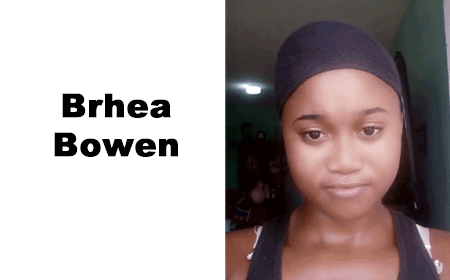BELIZE CITY, Wed. May 9, 2018– Yesterday in the Supreme Court of Justice Shona Griffith, a constitutional challenge to what has been described as “the Draconian gun law” was heard. Following the two-and-a-half hour hearing, Justice Young informed attorney Anthony Sylvestre, who appeared for the claimant, and Crown Counsel Briana Williams, who appeared for the Attorney General of Belize and detective corporal Adrian Lopez — who are the defendants, that she would hand down her judgment on June 14.
The civil lawsuit has its genesis in a raid that was carried out at a home on Lacroix Boulevard, in the Lake Independence area, in July 2012, by Gang Suppression Unit police. As a consequence of the raid, an entire family — a mother and her two children, one of them a minor — was charged with possession of unlicensed ammunition for two shotgun cartridges that the police found under their house. They were all remanded.
At the time of the GSU raid, Brhea Bowen was a 14-year-old high school student who was heading to second form. For the young student, the experience was traumatic. The court remanded her to the Princess Royal Youth Hostel, and her mother, Romie Anthony, 47, and brother, Amir Anthony, were remanded to the Belize Central Prison. They had to apply for Supreme Court bail in order to regain their freedom.
The young Bowen was not at home when the GSU search was conducted; neither was her name on the warrant the police used to conduct their search. The warrant was in the name of her brother, Amir, who was only staying at the house because he was recovering from a surgery.
Under the provisions of the Amendment to the Firearms Act, however, all persons at any location where a firearm or ammunition is found are deemed to be in possession of such firearm or ammunition. Not only that, but the law is structured in such a way that punishment begins at the time of the discovery of any illegal firearm or ammunition. There is an automatic remand period of 90 days, before a magistrate can release a person on bail who is charged under the law.
One would imagine that such a case is straightforward: police search and find illegal ammunition, persons are remanded and charged, and the matter is disposed of in court within a reasonable time.
That was not the case with this family, who had to wait for four years while their matter meandered through the Magistrate’s Court system, before it finally collapsed when they were found not guilty, because police could not prove that any of them had knowledge about the three shotgun cartridges the GSU found under their house.
In the court papers, it is noted that when the GSU went to search the house, only Romie Anthony was at home, and when the cops went to the home, she was outside, leaving to go to work.
Corporal Adrian Lopez, the second defendant named in the claim, also caused a warrant to be issued for the claimant (Bowen) and her brother Amir Anthony, the court document said.
“The claimant, who was at a summer camp in Burrell Boom when the search was conducted, returned to her home on Friday, 6th day of July, 2012, and was informed that she needed to turn herself in to the police,” the court papers went on to say.
An older sister of Bowen accompanied her to the police station where she turned herself in, and was kept until Monday, July 9, when she was arraigned on the charge at the Magistrate’s Court.
Bowen’s brush with the Firearms Law “earned” her a place at the Princess Royal Youth Hostel, where she remained for 70 days, missing the first three weeks of school when it reopened in August 2012.
She was released on Supreme Court bail on September 14, and spent the next four years of her life attending court, which had “a traumatic toll on her,” Bowen said in her claim.
The claim states that her constitutional rights were infringed upon by the second defendant (Corporal Lopez) when he caused a warrant to be issued for her apprehension, which led to her being detained for 70 days for the offense of “kept ammunition without a gun license under the Firearms Amendment Act” (Act No. 28 of 2010 now repealed), Bowen’s claim said.
Bowen’s constitutional claim is directed towards her arrest, detention, charge and trial under criminal legislation which was enacted in 2010 (but Gazetted in February 2011). The law was passed to address public concern about the increase in firearms-related offenses.
Bowen claims that her constitutional rights, guaranteed under the Belize Constitution, that a person is not to be deprived of their personal liberty, “unless upon reasonable suspicion of having committed or about to commit a crime, and her right to be presumed innocent until she proved or has pleaded guilty” were violated.
In April 2016, Allison Major succeeded in a similar challenge to the Firearms Amendment Act, when Justice Michelle Arana ruled that his constitutional rights were violated after he was arrested and charged for a firearm and ammunition that were found at a house. Major was awarded monetary damages by the court.

